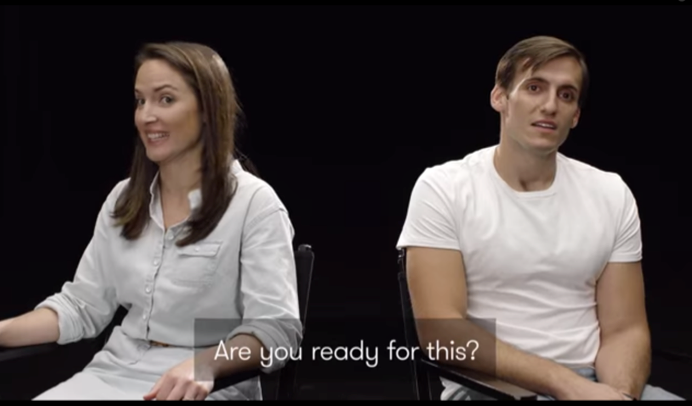
"Maybe you’ll meet the perfect person who you love infinitely, and you even argue well and you grow together and you have children, and then you get old together and then she’s gonna die. That’s the best-case scenario, that you’re gonna lose your best friend and then just walk home from D’Agostino’s with heavy bags every day and wait for your turn to be nothing also."
- Louis C.K.
"And when two mature persons are in love, one of the greatest paradoxes of life happens, one of the most beautiful phenomena: they are together and yet tremendously alone, they are together so much so that they are almost one."
- Osho
The soon-to-be-official couple in the video below exemplify what culture (in the USA, at least) has painted as the perfect romance. They are obviously smitten with each other, eager to be married soon, perfectly at peace with and excited for the slow decline of age together. And for everyone who grew up suckling on the same sweet story, it’s a totally heart-warming thing to watch.
But maybe it is also just a little creepy. These are not two people satisfied by being fully present in their love; they’re both awaiting an event they seem to think will change the love they feel and offer them security and comfort missing from their lives so far. Right now they’re two, but after ritual acknowledgment they’ll magically be one. The loneliness will soon be over!
It is certainly unpopular to say so, but perhaps this kind of love is actually the symptom of an illness – a common one, in which the wholeness that we are is divvied up and sought in something “out there,” and we put unreasonable expectations on the relatively stable patterns we call “lovers,” that they ought to fill the existential void.
Animated by the story of the life they both imagine that they’ll lead together, the impact of ideas and expectations on their bodies and emotions rings out loud and clear. To simulate the best of all imagined futures – satisfied togetherness in age, reflecting on a life well-lived – produces such a vivid and compelling virtual reality, it grabs them both and squeezes tears.
Can a person live possessed this way and really see another person as the living mystery that they are? For all the social benefit that these terms might confer, are “wife” and “husband” spells by which we try to tame the wilderness within the human heart? What happens when one partner changes so substantially they don’t identify with who they were when vows were made? What need is marriage as a guarantee of recognition and support if, when we turn to look for who it is that needs to feel complete, we only find a deeper question? What value does an animating story of the permanence of love provide if we can place our trust in life to change, and always change, and love to be eternal, unconditional on static objects of affection?
So: marriage is a species of religion, insofar as both are ways in which romantic re-connection is pursued by those who do not feel complete already. Binding to the narrative of loss and rediscovery this way, we’re wearing double-image goggles: Heaven isn’t now, so we postpone our bliss in time; true love is out there somewhere, so we look for it in other people.
But there’s another kind of marriage – one in which the seeming-otherness a partner offers is an ever-burning invitation into inquiry and celebration of the mystery within which husbands, wives, and marriages appear. There’s room within the wholeness for a deeper, wider, spacious, unafraid, eternal love to manifest as individuals supporting one another in a durable relationship...exactly what we seek, but cannot find, when we mistake the ceremony for the inner transformation that it represents. If we awaken to marriage as a kind of theater for practice, who are we when the story’s over, curtains fall, and lights come up?

Great article and a timely read for me!
they're so cute though!
Voted....